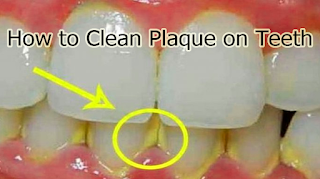How to Clean Plaque on Teeth
Many people take dental plaque lightly. Even though dental plaque can cause various decay of the teeth. Fortunately, there are several ways how to clean plaque on teeth that are quite effective for maintaining oral health.
Dental plaque is a sticky, clear layer on the surface of the teeth, which is formed from food debris. If not cleaned, dental plaque will harden into tartar which can cause damage to the teeth and also the supporting tissues of the teeth.
Food debris and plaque that has accumulated into tartar will be converted by bacteria or germs into acids which can damage teeth and cause cavities. In addition, the buildup of food debris and bacteria can cause gum irritation and bad breath problems.
Also read articles about:
How to Clean Plaque on Teeth At Home
The following is how to remove plaque on teeth at home that you can do and also through the handling of a dentist. Please see the explanation as follows.
1. Consuming Fruits and Vegetables
How to remove plaque on teeth naturally? You can chew fruits and vegetables regularly, especially if what you eat is apples, melons, carrots and celery. So, the dental plaque that sticks to the teeth will disappear effectively. Apart from being able to remove plaque on the teeth, these fruits and vegetables can also get rid of bad breath. In addition, you can also eat fruit that contains vitamin C to get rid of stubborn dental plaque.
2. Clean dental plaque at the dentist
How to remove plaque on teeth dentist? You can go to the dentist at least every 6 months to check and clean your teeth. By cleaning your teeth by the dentist, the plaque on your teeth will disappear so that your teeth will be healthier.
3. Brush your teeth regularly
The best way to deal with dental plaque is to brush your teeth twice a day, every morning and night. Brushing your teeth twice a day can help prevent plaque build-up and destroy any plaque that has started to build up. The bacteria that cause plaque will continue to grow, so you have to brush your teeth regularly.
For maximum results, brush your teeth for two minutes with a soft-bristled toothbrush and toothpaste that contains fluoride. The fluoride content can protect teeth by binding the enamel and creating a tougher surface. Make sure all parts are brushed clean. Don't forget to replace your toothbrush every 3-4 months. That's how to clean plaque off teeth that you can do at home.
4. Using dental floss and mouthwash
How to remove dental plaque can be done by using dental floss. By using dental floss, plaque that is found between the teeth can be easily reached and cleaned. Besides that, you can also provide additional protection for your teeth by using mouthwash. Mouthwash can not only provide protection for teeth but also remove extra dental plaque compared to using dental floss and fluoride toothpaste.
5. Using baking soda and orange peel
How to remove hard plaque on teeth can use baking soda. Besides that, baking soda can also give a white impression to the teeth quickly. How to use it: mix 1 tablespoon of baking soda with a pinch of salt. Stir the mixture until evenly then dip the wet toothbrush in the mixture. Use it to brush your teeth for 2 minutes and then wash it with a gargle.
In addition, you can also remove black plaque on stubborn teeth with orange peel. How to remove black plaque on teeth is to first clean the orange peel. Rub the orange peel directly on the teeth evenly. Leave it for overnight then rinse the next day with a rinse. To get maximum results, do this every day before bed.
That's how to clean plaque on teeth. If your teeth are covered with plaque you don't worry because plaque can be removed. Dentists can perform treatments to clean teeth from dental plaque. The re-formation of plaque on the teeth can be prevented by maintaining oral hygiene, avoiding eating sweet and sticky foods, and avoiding smoking.






